|
|
|
monthly news from ASAP | JANUARY 2021 | asapconnections.org
|
| |
|
|
Registration Is Open for the Business of Farming Conference
|
Have you registered for the Business of Farming Conference (held virtually Feb. 25-27)? Early-bird registration rates are available until Feb. 1. Register now to save! Discounts are also available for Appalachian Grown certified farms as well as for farm partners registering together.
Get financial assistance. ASAP is offering a limited number of first-come, first-served New and Beginning Farmer and Racial Equity scholarships for growers in the Appalachian Grown region. In addition, Empowering Mountain Food Systems is offering scholarships to residents of Haywood, Jackson, Swain, Macon, Clay, Cherokee, and Graham Counties and the Qualla Boundary.
Find workshop details. The conference will offer more than a dozen workshops led by farmers and regional professionals, including several that address the continued effects of COVID-19 on the industry, such as Direct Marketing in the Time of COVID, Optimizing Your Online Store, and Planning for Meat Sales in 2021. Attorneys from Ward and Smith, P.A., a sponsor of the conference, will lead 21st-Century Legal Issues in 2021: Challenges Facing Agribusinesses.
|
|
 |
New Location for ASAP Farmers Market
|
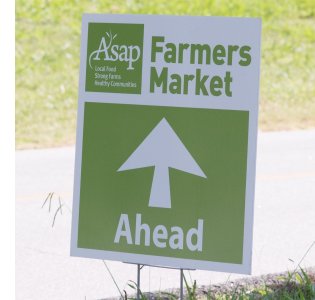 Due to facility needs for COVID-19 vaccinations, the ASAP Farmers Market is once again moving to a new location on the A-B Tech campus. Starting Saturday, Jan. 24, find the market on the east side of Victoria Rd. by the Bailey Student Services Center. Enter via Student Circle (about 400 feet south of the Fernihurst Dr. turn to the previous location) and follow market staff directions to park or queue inside your vehicle. Handicapped parking is available and there is a bus stop on the S4 route adjacent. Due to facility needs for COVID-19 vaccinations, the ASAP Farmers Market is once again moving to a new location on the A-B Tech campus. Starting Saturday, Jan. 24, find the market on the east side of Victoria Rd. by the Bailey Student Services Center. Enter via Student Circle (about 400 feet south of the Fernihurst Dr. turn to the previous location) and follow market staff directions to park or queue inside your vehicle. Handicapped parking is available and there is a bus stop on the S4 route adjacent.
The winter market will continue outside at A-B Tech on Saturdays from 10 a.m. to 1 p.m. through March 27. Stay up to date on market news via Facebook, Instagram, and weekly e-newsletters.
|
|
 |
Apply for Farm to Preschool Funding
|
 With funding from the Association of State Public Health Nutritionists, the NC Farm to Preschool Network is awarding 40 Farm to ECE Implementation Grants (FIG) to childcare centers and family childcare homes that want to start or enhance farm to preschool programming. Priority will be given to centers or homes that participate in the CACFP, serve BIPOC communities, and have not received Farm to ECE Collaborative, Growing Minds, or Shape NC funding in the past two years. In addition to a $500 grant, FIG recipients will attend virtual training sessions, be paired with mentors for coaching, and receive a literacy box and other resources. Learn more and apply here. The deadline is Jan. 31.
Funding is also available for mentor sites. Mentors can be from traditional TA organizations or from childcare centers and homes already implementing Farm to Preschool programming. Find the mentor application here. |
|
 |
Start Thinking About Joining a CSA!
|
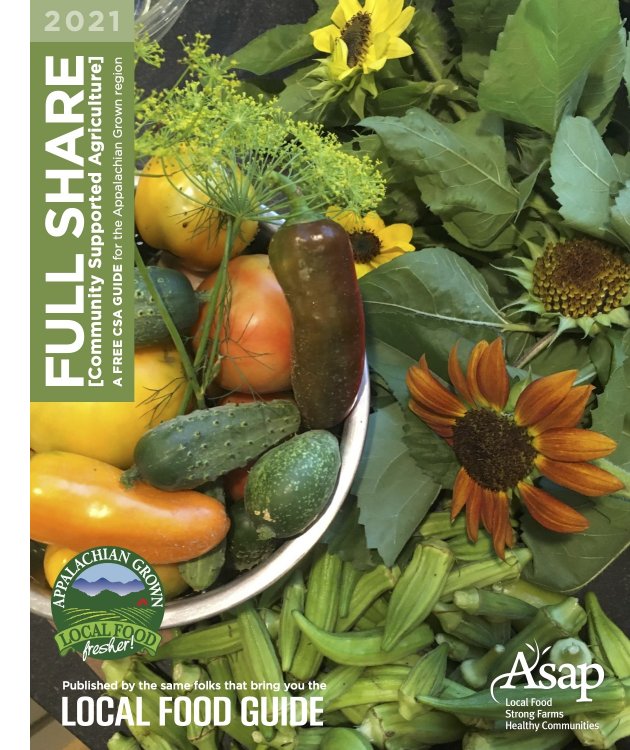
Community Supported Agriculture (CSA) programs have grown in popularity in recent years, particularly last year as the pandemic raised fears around grocery shopping. Want to learn more about CSAs and find the right farm share for you? Look for the 2021 edition of Full Share, ASAP's free CSA resource. The guide includes listings for more than 60 CSA farms throughout the region with a wide variety of CSA options. Find the guide at winter farmers markets and community centers in the region.
Have more questions about CSAs? Visit a CSA fair in your community. This is a chance to talk with farmers and learn more about their specific offerings.
In North Carolina (hosted by ASAP):
- March 10, 4–6 p.m., a virtual fair serving Buncombe Co. and the surrounding region
In Tennessee (hosted by Appalachian RC&D):
- Feb. 20, 10 a.m.–1 p.m., Kingsport
- March 6, 10 a.m.–1 p.m., Johnson City
- March 13,10 a.m.–1 p.m., Greeneville (pending enough interest)
|
|
 |
Leadership Transition at ASAP
|
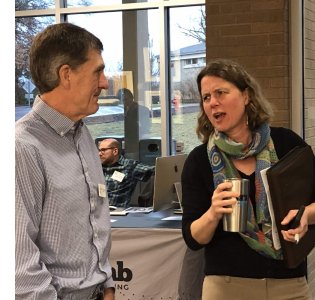
ASAP has transitioned to a co-directorship model under the shared leadership of Charlie Jackson and Molly Nicholie. Charlie was a founder in the mid-1990s of what would become ASAP and has served as Executive Director since 2005. Molly joined ASAP in 2005, working on the Growing Minds Farm to School program, then became director of the Local Food Campaign in 2014.
Charlie and Molly will share the responsibility of leading ASAP while both remaining involved in ASAP's projects and programs. This forward-looking model will allow ASAP to more effectively develop and deliver services and resources while continuing to respond to the challenges facing our communities and looking forward to new opportunities. |
|
 |
Jan. 31 Deadline to Get in the 2021 Local Food Guide
|
Have you updated your farm or business listing for ASAP's annual Local Food Guide? You have 10 days left! Make your updates on your own online (login here) or over the phone with ASAP's support team (call our dedicated Local Food Guide line at 828-419-0851). ASAP updates the Local Food Guide annually so that the community can stay up to date on how to find Appalachian Grown food and farms. (Check out our abbreviated 2020 Local Food Guide here.) Have a new farm, restaurant, retail outlet, or other locally sourcing food business that you want to be listed? You can register that here.
|
|
 |
 FACES OF LOCAL FACES OF LOCAL |
| | 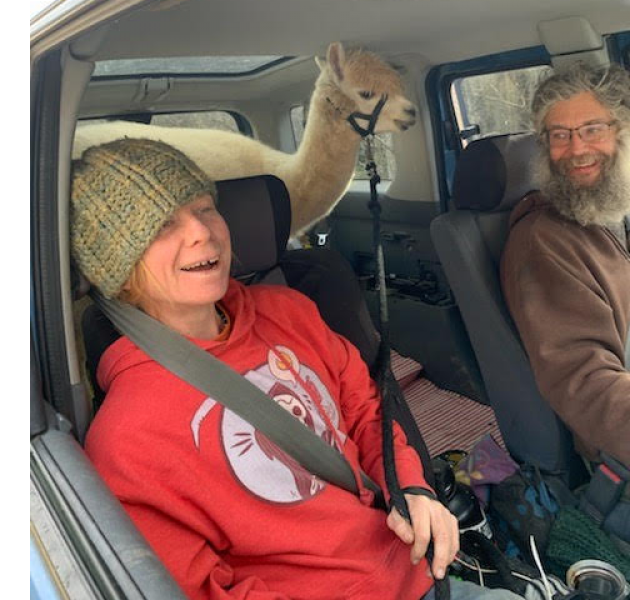
ASAP likes to share the stories of people who help us fulfill our mission. This month we talk with farmer Natalie Geradot, who operates Myco Rhizing, a small farm growing medicinal mushrooms and herbs in Fairview, N.C., with her husband, Grant, and daughter, Rosa Lee.
As someone who has previously attended ASAP's Business of Farming Conference, what were some of your takeaways from the experience?
The first time we attended—we have been twice—the Farmer Toolkit and informational pamphlets were very useful. We met many new friends and collaborators over the two conferences. We gained knowledge about everything from legal issues and taxes to food safety and farm story building. Both of us attending made it possible to go to most of the workshops. We also gained clients that we have kept for years at the Grower-Buyer Meeting and have many accounts waiting because of connections there.
Are you able to apply resources from the conference to the daily operations of your farm?
Our daily operations are definitely affected by the conference. Our customers came from meetings there. Our food safety plan arose out of a workshop at the conference.
Why would you say the Business of Farming Conference is a valuable resource for local farmers?
In my opinion, farmers need each other. We are too busy in our daily operations to get together in a big way and communicate needs, wants, gaps, etc. The conference is a chance to share information, contacts, and knowledge and a chance to ask questions of officials without having to schedule fifty different farm visits. It also, especially the first time, connects you with support programs and opportunities.
2020 was a challenging and unprecedented year for many, prompting shifts and novel strategies. How has Myco Rhizing been impacted by COVID-19 and what changes have you made?
Our mushroom farm was in the beginning of a grant-funded expansion when this started. Our whole business was wholesale to restaurants, so we had to immediately shift to retail delivery and pick up. Then, we had to shift back and try to not lose the new customers when restaurants reopened. We did lose some because we could not fill all the orders. Then, recently, we had to try and shift again as restaurants and markets wind down.
Was anything you learned at the Business of Farming Conference applicable to the way you shifted operations during the pandemic?
We had marketing knowledge and resources from the conference that we could quickly put to use.
Find out more about this year's virtual Business of Farming Conference and register now.
|
|
|
|
 RECIPE OF THE MONTH RECIPE OF THE MONTH |
| Massaged Kale Salad with Vegan Creamy Brie Dressing
|
|
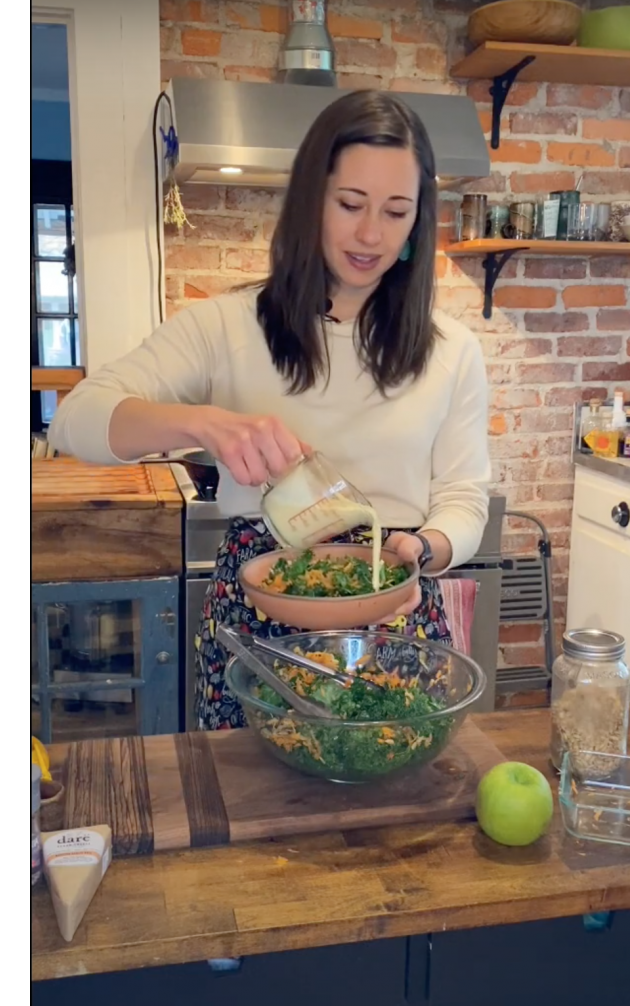 As part of ASAP’s Farm Fresh for Health initiative, we’re partnering with community health professionals to bring you virtual cooking demos to start the new year. First up is Registered Dietician Lauren Furguiele of Planting Roots Nutrition. Watch the full video here!
Dressing Ingredients: As part of ASAP’s Farm Fresh for Health initiative, we’re partnering with community health professionals to bring you virtual cooking demos to start the new year. First up is Registered Dietician Lauren Furguiele of Planting Roots Nutrition. Watch the full video here!
Dressing Ingredients:
- 1 teaspoon high heat oil, such as avocado or grapeseed
- ½ to 1 tablespoon minced shallots
- 3 tablespoons Darë vegan garlic brie, room temperature
- 2 tablespoons extra virgin olive oil
- 1 tablespoon water
- Juice from ⅓ lemon
- 1 garlic clove or ¼ to ½ teaspoon minced garlic
- Salt and pepper to taste
Salad Ingredients:
- 1 bunch kale, washed and destemmed
- Juice from ½ lemon
- 1 to 2 tablespoons light, sweet vinegar, such as white balsamic
- Optional add-ins:
- Sliced or shredded carrots
- Green onions/scallions
- Sauteed mushrooms
- Diced apples
- Protein, such as eggs or meat
- Nuts or seeds
To make the dressing:
- Heat 1 teaspoon of high heat oil in pan at medium-low heat.
- Add minced shallot and sauté on low heat for about 3 minutes, or until shallots begin to slightly brown. Keep a close eye on them as you do not want them to burn!
- Remove shallots from pan.
- Add all ingredients (cooked shallots, garlic brie, extra virgin olive oil, water, lemon, garlic, salt, and pepper) to blender or food processor. Blend until smooth. NOTE: If you don’t have a blender or food processor, you will need to mince the garlic in advance, and then simply add all of the ingredients to a bowl and whisk until smooth.
- Store dressing in the fridge between use. NOTE: it will harden in the fridge. Let it sit out for a bit before using to allow it to come to room temperature.
To assemble the salad:
- Add your washed and destemmed kale to a large bowl.
- Drizzle lemon juice and vinegar on over the kale.
- Using clean hands, massage the liquids into the kale for about 1 to 2 minutes, until all of the kale is evenly massaged and coated. The volume of kale will slightly decrease in size. Be conservative with the amount of vinegar you initially add, as you can always add more if you feel like you need more liquid to coat the kale.
- Optional: Now you can get creative and top your salad with additional add-ons if you want. You can make this as simple or complex as you want.
- Top the massaged kale salad with the vegan creamy brie dressing!
|
|
|
|
PHOTOGRAPHER SPOTLIGHT |
|
Our January photo of the month comes from Sheila Greene of North Fork Farm.
|
|
|
|
 MEDIA HIGHLIGHTS MEDIA HIGHLIGHTS |
| |
|
|
|
|
 ASAP’s Growing Local audio series runs on WNCW on Monday mornings during Morning Edition at 8:45 a.m. Here are a few recent episodes: ASAP’s Growing Local audio series runs on WNCW on Monday mornings during Morning Edition at 8:45 a.m. Here are a few recent episodes:
You can listen to all Growing Local episodes on SoundCloud, iTunes, or on ASAP's website.
|
|
 |
|
| | |
ASAP's mission is to help local farms thrive, link farmers to markets and supporters, and build healthy communities through connections to local food.
|
|
|
|
|
|
|
|
|
|
|